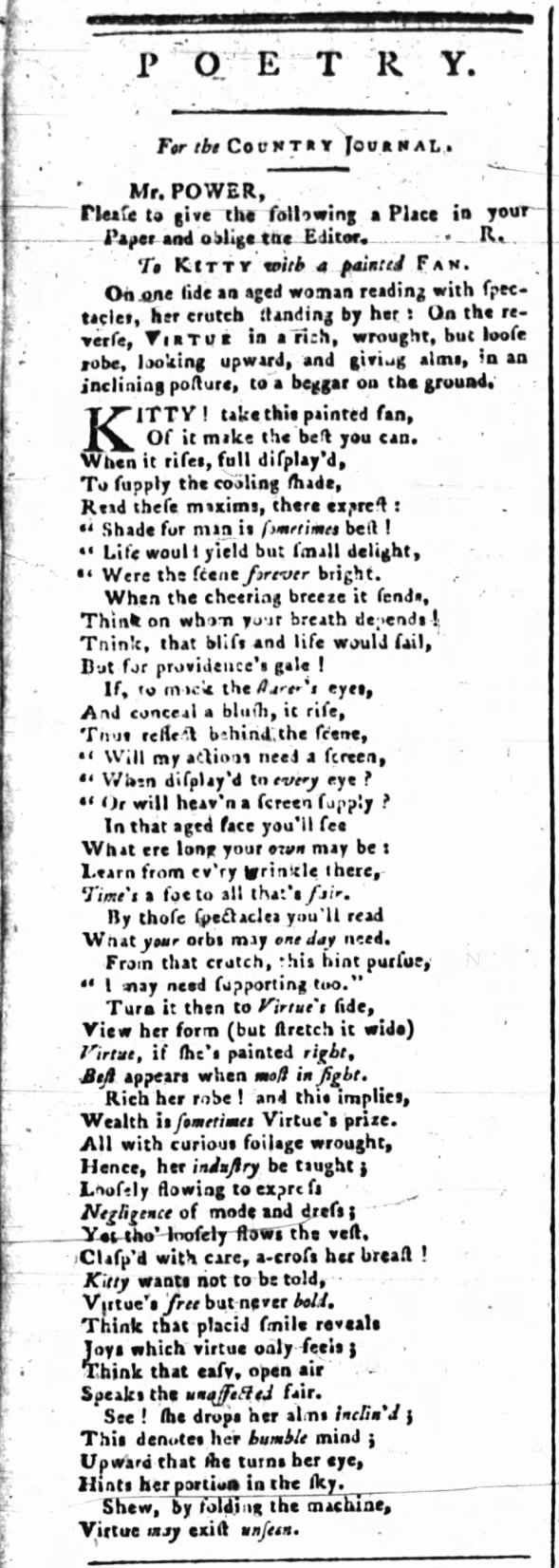In the late 1700's the Poughkeepsie
Journal occasionally printed contributions of poetry and prose signed "R," some of which have been ascribed by descendants to local farmer and surveyor
Henry Livingston, Jr. Here's an otherwise uncredited poem forwarded by "R." under the title "To KITTY with a painted Fan," and published in the Poughkeepsie
Journal on November 11, 1788. In the Poughkeepsie
Journal, "R." describes himself as "the Editor" (rather than author) of the poem and does not say who wrote it. The same poem had appeared over the signature of "J. G." more than thirty years before, in the March 1750 number of
The Gentleman's Magazine. The prose intro and body of the poem are essentially the same in both
versions. The only significant revision made by "R." the Poughkeepsie
"Editor" was to change the name of the addressee from "Mira" to "Kitty."
"To Mira" was reprinted under its original title in
The Lady's Preceptor (London, 1792), compiled by "Mr. Cresswick."
 · Tue, Nov 11, 1788 – Page 4 · Poughkeepsie Journal (Poughkeepsie, New York) · Newspapers.com
· Tue, Nov 11, 1788 – Page 4 · Poughkeepsie Journal (Poughkeepsie, New York) · Newspapers.com
Related posts:
 · Tue, Nov 11, 1788 – Page 4 · Poughkeepsie Journal (Poughkeepsie, New York) · Newspapers.com
· Tue, Nov 11, 1788 – Page 4 · Poughkeepsie Journal (Poughkeepsie, New York) · Newspapers.com

You are truly a research blessing! I had found that poem during our last research go round and we had examined it, assuming it WAS an original poem of Henry's. I have COVETED, truly coveted, a black box into which I could put a poem and have it come out the other end with the answer whether the poem was by Henry or not. And Mac, blessed man that he is, helped design an attempt at that. We replaced the analysis of the body of Moore's work with the body of random poets, with a counter body of poets of the same time and publications known NOT to be by Henry, and tried to see what could be seen. Kitty was in my assumption group to be by Henry, but the numbers just didn't come out strong enough to say that it was by Henry. Well, you just showed us why!
ReplyDeleteGawd, I love research!
Mary
Mary Van Deusen
http://www.henrylivingston.com
You might also be interested that the following pieces came out as Henry's using that black box approach:
ReplyDeleteMorning Chronicle contains extract from Political Barometer, 4 Jan 1806, p2
Political Barometer 7 Jan 1806, NY Author to Friend
PJ, 1 Jan 1811, Stephen Marshall
Northern Whig, 1 Jan 1812, anon, Hudson NY
note the night visitor, but this time a nightmare
Northern Whig, 1 Jan 1813, anon, Hudson NY
Northern Whig, 1 Jan 1814, anon, Hudson NY
rewrite of 1812; note matter=clatter rhyme
Northern Whig, 1 Jan 1816, anon, Hudson NY
A magic box would be nice to have for identifying authors of anonymous publications. Especially anonymous verse, especially the kind (like Henry's) that closely imitates British models. For instance Henry's Queen of Love Rebus ("FAIRER than the queen of love, Constant as the turtle Dove...") reworks lines from "To his valentine" published in 1719 and later attributed to Richard Lovelace:
ReplyDelete>>She's chaster than the Turtle-Dove,
And fairer than the Queen of Love; <<
https://books.google.com/books?id=3_xaAAAAMAAJ&pg=PA127&lpg=PA127&dq#v=onepage&q&f=false
So it's mostly a guessing game with plenty of room for argument.
Those Carrier addresses potentially offer more clues in topical references and historical particulars of newspaper publication. For the Barometer items, you wouldn't want to overlook editor Isaac Mitchell. Harry Croswell of the rival Balance attributed New Year addresses and other poetry in the Barometer to Isaac Mitchell. Columbia Rising by John L. Brooke (U of North Carolina Press, 2010) has great background on Mitchell in Poughkeepsie.
Does Henry ever say "grannum" as in the 7 Jan 1806 address? Mitchell does elsewhere, in the "Proem" castigated by Croswell.
http://melvilliana.blogspot.com/2017/03/more-poetry-by-isaac-mitchell-in.html
The satire in some of those Northern Whig items feels extremely partisan and local, reflecting political divides in Hudson more so than Poughkeepsie. My favorite candidate for authorship of the 1812 News-boy's Vision is Elisha Williams. But now I see the 1814 Address you cite is headed, "The Carrier of the 'American' to his Patrons." Meaning I take it the Herkimer American, which would bring a gifted teenager, William Leete Stone to the front row of authorship candidates. Woo-hoo! perfect timing, according to Appleton's Cyclopaedia of American Biography, Volume 5: >>"in 1813 he [William Leete Stone] was editor of the Herkimer "American," with Thurlow Weed as his journeyman. Subsequently he edited the "Northern Whig" at Hudson, N. Y., and in 1817 the Albany "Daily Advertiser."<<
https://books.google.com/books?id=HlYYAAAAIAAJ&pg=PA705&lpg=PA705&dq#v=onepage&q&f=false
Looks like we need a box big enough to hold Isaac Mitchell, Elisha Williams AND William Leete Stone.
For Stone's politics at the time, see his prose "ADDRESS Of the New Editor of the Northern Whig, TO HIS PATRONS"; published in the Northern Whig on Tuesday, January 3, 1815.
DeleteIn verse the satirical "Ball" in the Northern Whig for March 14, 1815 appears to be editor Stone's. Both exhibit the Federalist agenda and flavor of the Carrier Addresses in 1815 and 1816.
>>Does Henry ever say "grannum" as in the 7 Jan 1806 address?
DeleteNo. To check on Henry's vocabulary, use the program:
http://www.henrylivingston.com/data/countablepoems/merge/manycolors.cgi
Every word of every poem is color coded to the author and alphabetical.
>>Isaac Mitchell
DeleteI've gone bonkers trying to connect Isaac Mitchell to Thomas Mitchell, Henry's next door neighbors and relatives by marriage. Thomas and Henry are married to sisters. Henry's son marries the child raised in the house, Eliza Clement Brewster. Thomas is the son of Robert and Statia Clements, but I find no child that has a child that ties to Isaac. Thomas is Long Island origin.